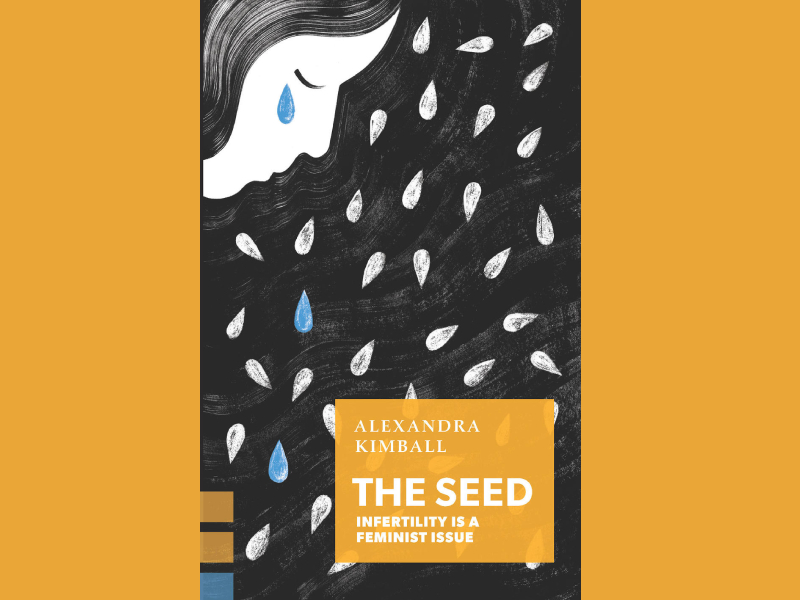|
By Yulia Fedorov A woman’s inability to conceive a child is a heavy subject that few choose to discuss openly. Shrouded in mystery and tainted with ‘shame’, it’s a topic of discussion that has historically remained behind closed doors, or within the confines of online anonymous support groups. That’s one of the main reasons why seven-time award nominated, Toronto-based journalist, Alexandra Kimball’sdebut novel, The Seed: Infertility is a Feminist Issue, is necessary now, more than ever. In the book, Alexandra weaves the narrative of her personal struggles with infertility, along with an in-depth critique of how feminism, and other facets of society, ignore and neglect women struggling to conceive. Although feminism should be representative of all women, Kimball explains why it is very selective with the issues it covers. Placing an emphasis on the problems of middle-upper class white women, feminism has, from its very beginning, favoured the problems of the privileged, while grossly neglecting those that affect minority groups. In this manner, when it comes to reproductive rights, feminism privileges the rights for a woman to abort a child, over those to be able to carry one. “Bringing infertility into the conversation is really important, because this is also a raced and a classed issue,” Kimball says. “The majority of infertile women in the world do not have access to any sort of health care, let alone IVF (in-vitro fertilization) or advanced technology.” And while she agrees that abortion should be legal and birth control accessible, “it’s the narrowness of the focus that concerns me,” she says. “When you broaden it, I think the conversation will be much deeper, more fruitful, and more representative of what women are actually going through vis-a-vis their reproductive lives.” One of the main problems with neglecting infertile women from the feminist narrative, Kimball analyzes in her novel, is that it leads them to be viewed through a stereotyped lens. From religious texts to modern day media, the token infertile woman is viewed either as a monster, or as an object of pity—and never as a multifaceted human being. She is expected to remain silent and never complain, or else risk the label of the bitter, threatening barren woman. She is expected to wait patiently and quietly for a miracle to happen, rather than actively trying everything she can to conceive. If they are even examined in texts and in the media at large, the inconceivable woman’s experiences are often viewed only through a medical lens. But as Kimball points out, a clinical narrative of infertility only aids in contributing to the dehumanization of such women. “Infertility is a medical issue, but it’s a lot more than that as well, because it affects your relationships, it affects your sense of self, it affects your place in your community,” Kimball explains. Unlike other texts and media representations of infertility, Kimball brings humanity and complexity into the story of the infertile woman. She describes the multiple layers of grief and isolation she experienced, and gives readers a deeper understanding of what this rarely discussed struggle feels like. While her mission with this novel is to educate readers who have never experienced infertility, she also seeks to provide solace and a sense of community to those who do. “The main thing I want [infertile women] to know is that their struggle is valid. It’s valid, it’s worthy of being discussed, and they should have a say in how the public conversation about infertility and reproductive technology is framed,” Kimball exclaims.
With its behind-the-curtain look at the nuances of being a woman with infertility throughout history, its thorough critique of feminism, and its raw examination of the complexities surrounding one’s inability to conceive, Alexandra Kimball’s book is a must-read for every feminist. For more information about The Seed: Infertility is a Feminist Issue, and how to purchase it, click here. |
Recent Posts
Categories
All
Archives
February 2022
|
|
GET THE APP!
Listen to VIBE 105 anywhere you go!
|
OUR STATION
|
TUNE IN RADIO
|
STAY CONNECTED
|
Copyright © 2021 Canadian Centre for Civic Media and Arts Development Inc. Except where otherwise noted, presentation of content on this site is protected by copyright law and redistribution without consent or written permission of the sponsor is strictly prohibited.





 RSS Feed
RSS Feed


